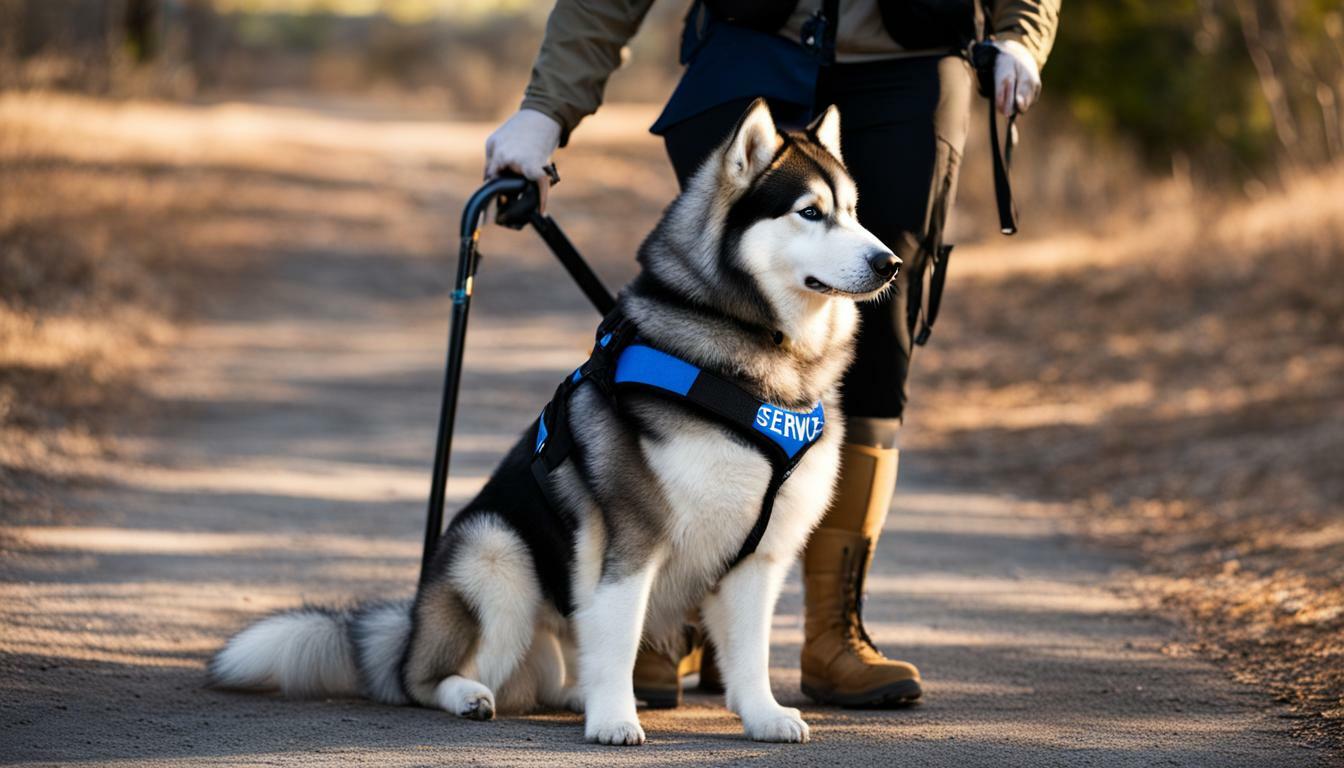Alaskan Malamutes are majestic dogs known for their strength and endurance, but can they be trained to be service dogs? While they may not be the first choice when it comes to professional service dog work, Alaskan Malamutes can still play important roles in providing emotional support and assistance.
Due to their independent nature and high prey drive, Alaskan Malamutes may not possess the temperament and obedience required for traditional service dog work. However, they can provide comfort and companionship to individuals with mental health issues. Additionally, Alaskan Malamutes can be valuable in practical services, such as assisting with yard work and accompanying on long hiking trails.
Training an Alaskan Malamute as a service dog requires patience, perseverance, and the guidance of experienced trainers and organizations. It’s important to consider other breeds, such as Border Collies, Golden Retrievers, Labrador Retrievers, and German Shepherds, which are typically better suited for service dog roles due to their trainability, focus, and temperament.
In the following sections, we will explore the suitability of Alaskan Malamutes for service roles, training requirements, service dog requirements, their role as emotional support animals, practical services they can provide, and the notable benefits of having them as service dogs. We will also discuss important considerations for Alaskan Malamute owners and provide resources for training these magnificent dogs for service work.
Suitability of Alaskan Malamutes for Service Roles
Alaskan Malamutes possess certain qualities that need to be considered when evaluating their suitability for service roles. These majestic dogs are known for their strength, endurance, and resilience, making them well-suited for physically demanding tasks. However, their independent nature and high prey drive can present challenges when it comes to obedience and focused attention, which are crucial traits for professional service dogs.
“Alaskan Malamutes are highly intelligent, but they have a strong sense of independence,” says Dr. Sarah Anderson, a canine behaviorist. “Their natural instincts as sled dogs often make them more prone to wander off or chase after small animals.” This independent streak can make it difficult to train them to perform intricate tasks that require consistent focus and adherence to commands.
Despite these challenges, Alaskan Malamutes can provide valuable services in certain capacities. As emotional support animals, they have an innate ability to provide comfort and companionship, particularly to individuals with mental health issues. Their gentle and affectionate nature can bring joy and alleviate anxiety, promoting emotional well-being.
| Positive Qualities | Challenges |
|---|---|
| Strong and resilient | Independent nature |
| Physically capable | High prey drive |
| Empathetic and affectionate | May lack obedience and focus |
When training an Alaskan Malamute for service work, it’s essential to exercise patience and consistency. Working with experienced trainers and organizations that understand the breed’s unique characteristics is crucial. They will be able to tailor the training methods to address the challenges while harnessing the dog’s strengths.
While Alaskan Malamutes may not be the ideal choice for professional service roles, their strengths and qualities can still make a positive impact. They can be a valuable source of emotional support and provide practical assistance in tasks such as aiding with yard work or accompanying individuals on long hiking trails. Ultimately, it’s important to consider the specific needs of the individual and assess whether an Alaskan Malamute’s qualities align with those requirements.
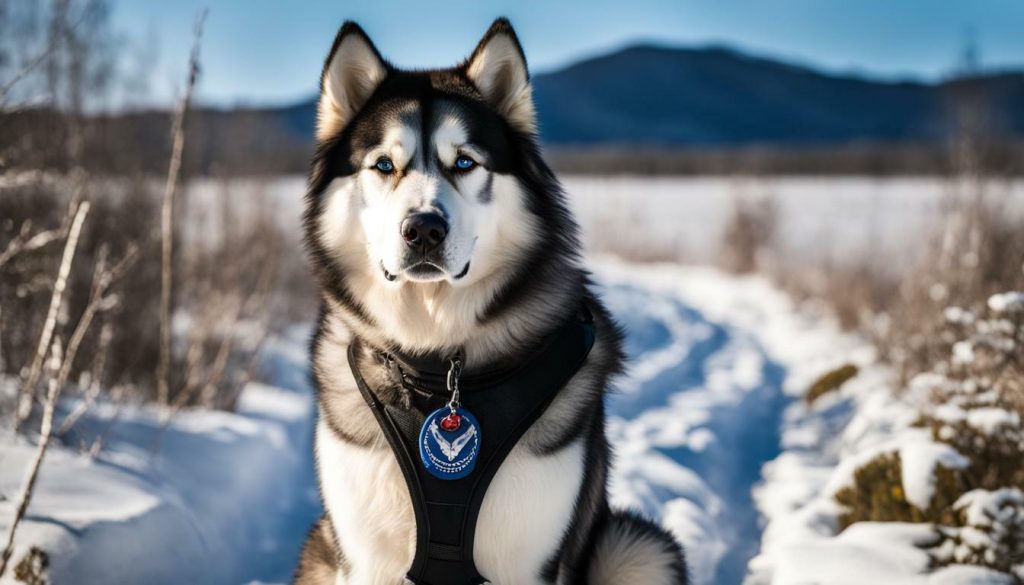
“Alaskan Malamutes have unique qualities that make them stand out, but it’s important to consider other breeds that may be better suited for professional service dog roles,” advises Dr. Anderson. “Breeds such as Border Collies, Golden Retrievers, Labrador Retrievers, and German Shepherds are often preferred due to their trainability, focus, and proven track record in service work.” These breeds exhibit a strong willingness to please and are more readily adaptable to the specific demands of service roles.
Alaskan Malamutes: A Source of Support and Assistance
While Alaskan Malamutes may not fit the traditional mold of professional service dogs, they possess qualities that can still provide valuable support and assistance to those in need. Their unique temperament and capabilities make them a cherished companion and a source of comfort in various capacities.
Training Alaskan Malamutes for Service Work
Training an Alaskan Malamute for service work requires a specific approach and dedication. While Alaskan Malamutes are known for their independent nature and high prey drive, with the right training and guidance, they can still perform certain tasks and provide valuable assistance. Patience and perseverance are key when working with these intelligent and strong-willed dogs.
It is crucial to collaborate with experienced trainers and organizations that specialize in training Alaskan Malamutes for service work. These professionals understand the unique challenges and requirements of this breed and can provide the necessary guidance and support throughout the training process.
“Working with Alaskan Malamutes for service work is a rewarding journey. They may have their unique traits, but with the right training, these dogs can excel in providing assistance and support.”
During the training process, focus should be placed on building a strong bond with the Alaskan Malamute. Positive reinforcement techniques, such as treats and praise, work well with these intelligent and food-motivated dogs. Consistency and repetition are crucial to reinforce desired behaviors and discourage unwanted ones.
It’s important to note that while Alaskan Malamutes can be trained to perform specific tasks, they may not possess the temperament and obedience required for a professional service dog role. Therefore, it is recommended to consider other breeds, such as Border Collies, Golden Retrievers, Labrador Retrievers, and German Shepherds, which are typically better suited for service work due to their trainability, focus, and temperament.
Training Alaskan Malamutes for Service Work
| Training Tips | Training Requirements |
|---|---|
| Use positive reinforcement techniques | Obedience training |
| Work with experienced trainers | Task training |
| Be patient and consistent | Temperament evaluation |
| Focus on building a strong bond | Socialization with different environments and people |
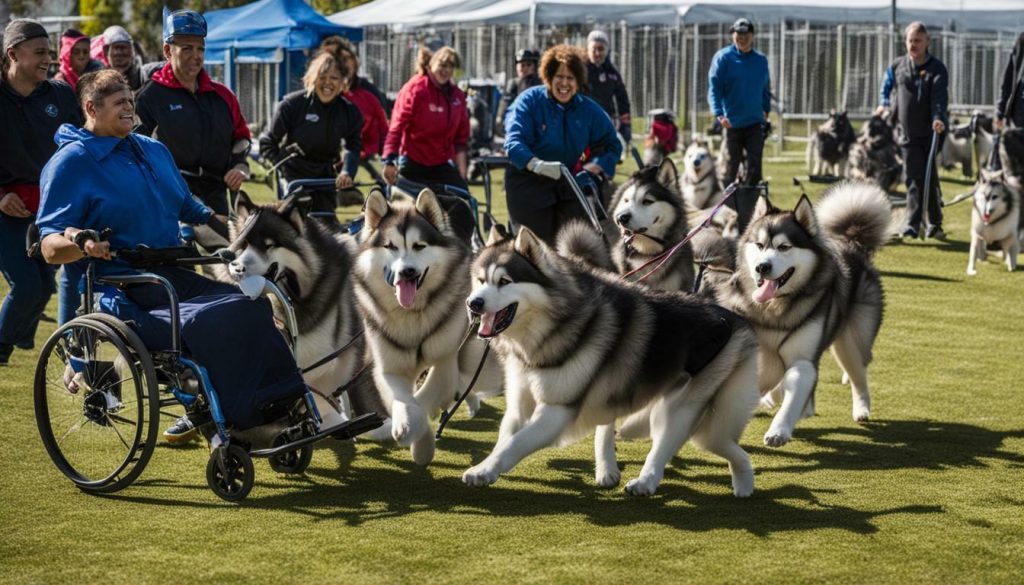
Service Dog Requirements for Alaskan Malamutes
To be considered a service dog, Alaskan Malamutes must meet certain requirements. While they may not be the typical breed recommended for professional service dog work, they can still be trained to perform specific tasks that can be beneficial to individuals in need of assistance.
First and foremost, Alaskan Malamutes must demonstrate obedience and the ability to follow commands reliably. This includes basic commands such as sit, stay, and come, as well as more advanced commands that may be specific to the tasks they are trained for. A well-trained Alaskan Malamute should be able to respond promptly and accurately to their handler’s commands.
In addition to obedience, Alaskan Malamutes must possess a temperament that is suitable for service work. Service dogs need to be calm, patient, and able to remain focused even in distracting environments. While Alaskan Malamutes can be independent in nature, with proper training and socialization, they can learn to become more focused and attentive to their handler’s needs.
It’s important to note that not all Alaskan Malamutes are suitable for service roles. Each dog is an individual, and their temperament and abilities can vary. Working with experienced trainers and organizations that specialize in training service dogs can help assess whether an Alaskan Malamute has the potential to excel in a service dog role. These professionals can provide guidance on the training process and offer support and resources to help maximize the dog’s potential.
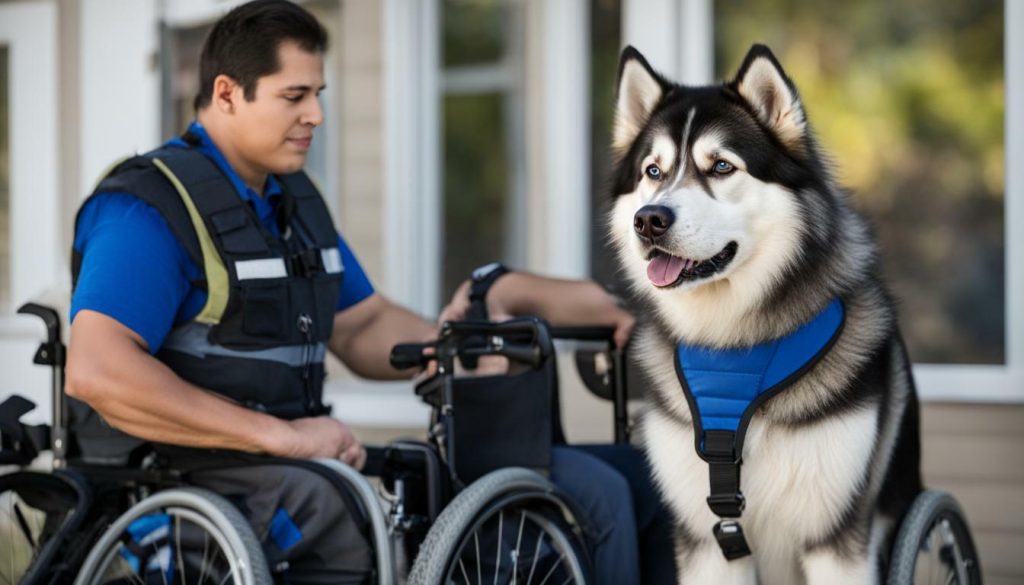
| Requirements for Alaskan Malamutes as Service Dogs |
|---|
| 1. Obedience: Alaskan Malamutes must demonstrate reliable obedience and the ability to follow commands accurately. |
| 2. Temperament: Alaskan Malamutes must possess a calm and patient temperament suitable for service work. |
| 3. Training: Alaskan Malamutes need to undergo extensive training to develop the necessary skills and behaviors needed for service work. |
| 4. Assessment: Working with experienced trainers and organizations is crucial to assess an Alaskan Malamute’s suitability for service dog roles. |
“Training an Alaskan Malamute as a service dog requires patience, perseverance, and the right guidance. It’s a journey that can be incredibly rewarding, but also challenging. By meeting the specific requirements and working closely with trainers, Alaskan Malamutes can provide valuable assistance and support to those in need.”
Alaskan Malamutes as Emotional Support Animals
While Alaskan Malamutes may not be ideal for service roles, they can still provide emotional support in certain capacities. These beautiful and affectionate dogs have a natural ability to provide comfort and companionship to individuals with mental health issues. Their calm and gentle demeanor can help bring a sense of peace and stability to those who may be struggling.
Whether it’s simply spending time with their owners or offering a snuggle during difficult moments, Alaskan Malamutes have a unique ability to understand and connect with people on a deeper level. Their presence alone can bring a sense of joy and relief, helping to alleviate feelings of anxiety or depression.
“My Alaskan Malamute has been an incredible source of emotional support for me. Whenever I’m feeling down, he’s right there by my side, providing comfort and love. His gentle nature and unconditional loyalty have made a world of difference in my life.”
It’s important to note that while Alaskan Malamutes can offer emotional support, they are not recognized as official Emotional Support Animals (ESAs) under the Americans with Disabilities Act (ADA). However, in settings where ESAs are permitted, such as certain housing accommodations, they may still be allowed to provide emotional support to their owners.
| Breed | Main Service |
|---|---|
| Alaskan Malamute | Emotional Support |
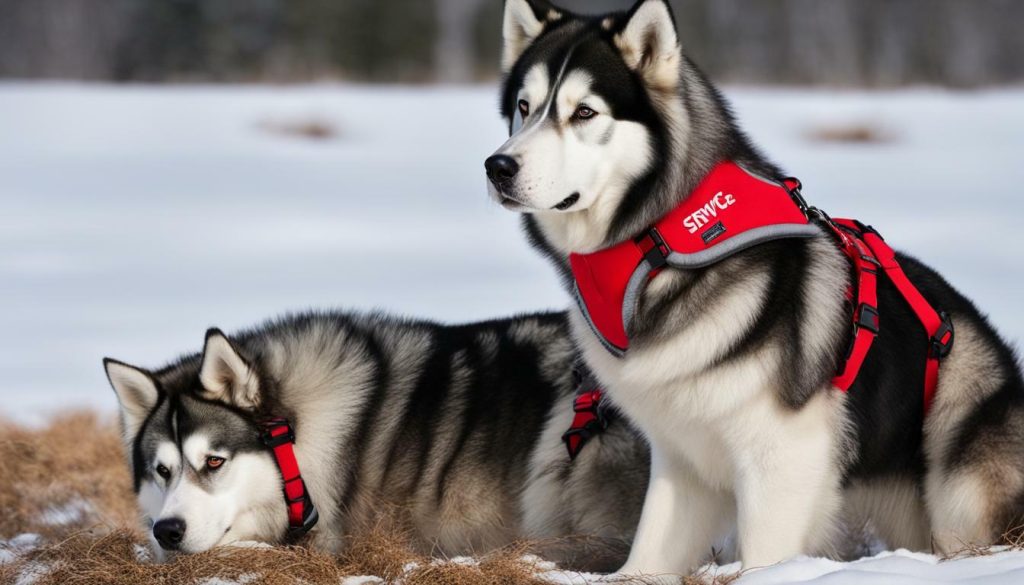
If you’re considering an Alaskan Malamute as an emotional support animal, it’s essential to ensure that you have the time, resources, and appropriate living situation to meet their needs. Regular exercise, mental stimulation, and socialization are crucial for their well-being.
Remember:
- An emotional support animal is not the same as a service dog, but Alaskan Malamutes can still provide emotional support in certain capacities.
- Alaskan Malamutes are not officially recognized as Emotional Support Animals (ESAs) under the ADA, but they may be allowed to provide emotional support in certain settings.
- Ensure you can meet the needs of an Alaskan Malamute before considering them as an emotional support animal.
Practical Services Provided by Alaskan Malamutes
Alaskan Malamutes can be helpful in practical service roles beyond traditional service dog tasks. While they may not possess the same level of trainability and focus as other breeds, their strength and endurance make them well-suited for certain physical tasks. For example, an Alaskan Malamute can assist with yard work by pulling heavy objects or helping with gardening tasks. Their size and power allow them to take on these tasks with ease, providing valuable support to individuals who may have physical limitations.
In addition to their physical capabilities, Alaskan Malamutes can also provide companionship on long hiking trails. Their love for the outdoors and their ability to navigate rough terrains make them ideal hiking partners. With their strong senses and protective instincts, they can provide a sense of security and comfort during outdoor adventures. Their presence can be especially beneficial for individuals who enjoy exploring nature but may require assistance or emotional support along the way.
Table: Alaskan Malamutes in Practical Service Roles
| Practical Services | Description |
|---|---|
| Yard Work Assistance | Alaskan Malamutes can help with heavy lifting, pulling, and other physical tasks in the yard, making them valuable partners in outdoor chores. |
| Hiking Companionship | Their endurance and love for the outdoors make Alaskan Malamutes ideal companions for long hikes, providing support and security on the trails. |
While Alaskan Malamutes may not possess the same aptitude for traditional service dog tasks, their unique abilities in practical service roles should not be overlooked. These dogs can contribute to the well-being and independence of individuals in various ways, bringing joy and assistance in their own distinctive manner. It is important to acknowledge and appreciate the strengths that Alaskan Malamutes possess, while also considering other breeds that may be better suited for professional service dog work.

Benefits of Alaskan Malamutes as Service Dogs
While there are challenges, there are also distinct benefits to having Alaskan Malamutes as service dogs. These majestic and powerful dogs can bring unique qualities to their role and make a positive impact on individuals in need of assistance. Although they may not meet all the requirements for professional service dog work, they can still provide valuable support in various capacities.
One of the significant benefits of Alaskan Malamutes as service dogs is their ability to provide emotional support. Known for their gentle and affectionate nature, these dogs can offer companionship and comfort to individuals with mental health issues. Their presence alone can provide a sense of calm and stability, and their warm and loving nature can help alleviate stress and anxiety.
Moreover, Alaskan Malamutes can excel in practical services that extend beyond traditional service dog tasks. They can assist with yard work, such as pulling a cart or carrying light loads, making them helpful companions for individuals with physical limitations. Additionally, their endurance and love for the outdoors make them ideal hiking partners, providing companionship and safety on long trails.
While Alaskan Malamutes may not be the typical choice for service dog work, their unique qualities and abilities can still make them valuable members of the assistance animal community. It’s important, however, to consider their individual temperament and training needs, and to explore other breeds that may be better suited for professional service dog roles.
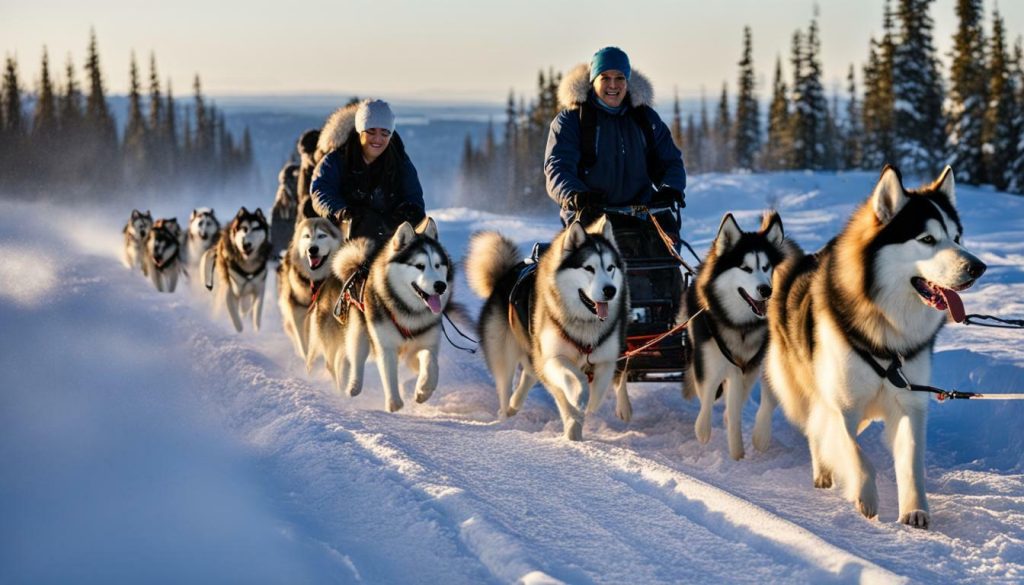
| Benefits | Considerations | Conclusion |
|---|---|---|
| Emotional support | Temperament and training needs | Alaskan Malamutes can provide valuable support as service dogs, especially in emotional support and practical roles. However, it’s important to consider their individual temperament and explore other breeds that may be better suited for professional service dog work. |
Considerations When Training Alaskan Malamutes for Service Work
Training Alaskan Malamutes for service work requires careful consideration of various factors. These majestic dogs are known for their independent nature and high prey drive, which can present challenges when it comes to obedience and focus. However, with the right approach and training methods, Alaskan Malamutes can still be valuable partners in certain service roles.
Patience and perseverance are key when training an Alaskan Malamute for service work. These intelligent and strong-willed dogs require consistent, positive reinforcement to understand and execute commands effectively. Working with experienced trainers and organizations specializing in training Alaskan Malamutes can greatly enhance the training process, ensuring that the dog receives the guidance and structure needed for success.
It’s important to recognize the limitations of Alaskan Malamutes as service dogs. While they may not possess the same level of trainability and focus as breeds like Border Collies, Golden Retrievers, Labrador Retrievers, and German Shepherds, they can still provide valuable emotional support to individuals with mental health issues. Alaskan Malamutes excel in offering companionship, comfort, and joy, making them wonderful candidates for emotional support roles.
| Training Considerations for Alaskan Malamutes | Training Recommendations |
|---|---|
| Socialization | Expose your Alaskan Malamute to various environments, people, and animals from a young age to promote positive interactions and reduce anxiety. |
| Consistency | Establish a consistent training routine and use positive reinforcement techniques to reward desired behaviors. |
| Task Training | Focus on specific tasks that align with the strengths and abilities of your Alaskan Malamute, such as providing comfort or assisting with physical tasks. |
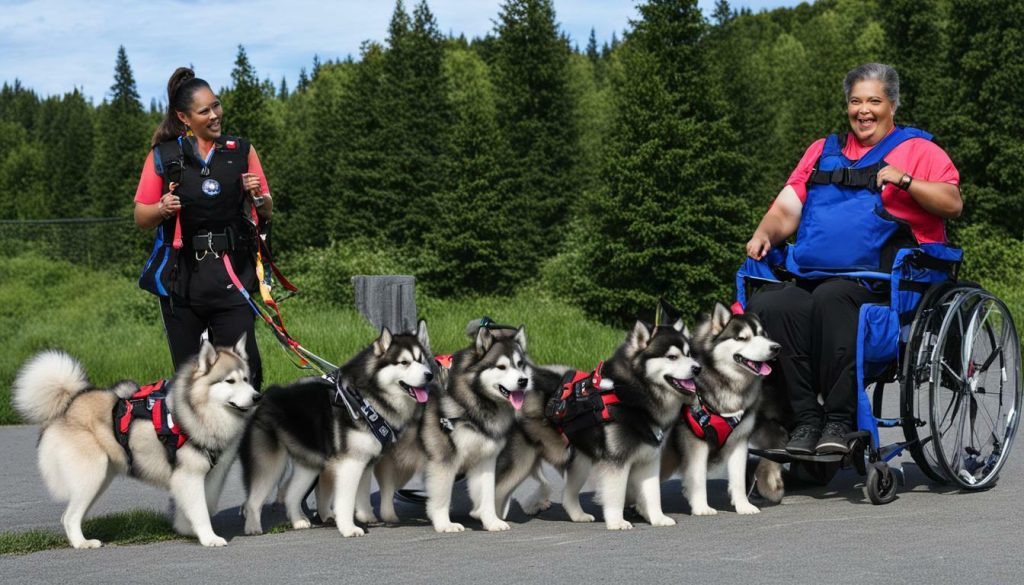
In conclusion, while Alaskan Malamutes may not be the first choice for professional service dog roles, they can still make a positive impact as emotional support animals and provide practical services. Training an Alaskan Malamute for service work requires patience, perseverance, and a tailored approach that takes into account their unique temperament and capabilities. By working closely with experienced trainers and considering other more traditional service dog breeds, you can ensure the best outcomes for both the dog and the individuals they are meant to assist.
More Suitable Breeds for Service Dog Roles
While Alaskan Malamutes have their unique qualities, other breeds are typically better suited for service dog roles. Border Collies, Golden Retrievers, Labrador Retrievers, and German Shepherds are among the top choices when it comes to professional service work. These breeds possess the traits, temperament, and trainability needed to excel in various service roles.
“Border Collies are known for their exceptional intelligence and trainability,” says Dr. Jane Wilson, a renowned dog trainer. “Their natural focus and ability to learn complex tasks make them excellent candidates for service work.” Along with their intelligence, Border Collies are highly energetic and excel in obedience training, making them an ideal choice for individuals with mobility, hearing, or visual impairments.
Golden Retrievers are another popular breed for service work. Their friendly and loyal nature, combined with their high level of trainability, makes them well-suited for tasks such as retrieving objects, providing stability, and alerting to medical conditions. Golden Retrievers have a natural desire to please their handlers, making them an excellent choice for individuals with disabilities.
| Breed | Trainability | Temperament |
|---|---|---|
| Border Collie | High | Intelligent, focused |
| Golden Retriever | High | Friendly, loyal |
| Labrador Retriever | High | Gentle, patient |
| German Shepherd | High | Confident, protective |
Labrador Retrievers are renowned for their gentle and patient nature, making them suitable for a variety of service roles. They are often trained as guide dogs for individuals with visual impairments. With their strong work ethic and adaptability, they can also excel in tasks such as alerting to medical conditions and providing emotional support.
German Shepherds are known for their confidence, intelligence, and protective instincts. These qualities make them well-suited for roles such as search and rescue, law enforcement, and medical alert work. Their versatility and strong training capabilities make them a popular choice for individuals in need of specialized assistance.
Choosing the Right Breed for Service Dog Work
When considering a breed for service dog work, it’s important to assess the specific needs of the individual and match them with a breed that aligns with those requirements. Factors such as energy level, size, and temperament should all be taken into consideration. Additionally, it’s crucial to work with experienced trainers and organizations that specialize in training service dogs to ensure the best possible outcome.
Ultimately, while Alaskan Malamutes may not be the optimal choice for professional service dog roles, they can still provide valuable emotional support and assistance in certain capacities. Each breed brings its own unique qualities to the table, and it’s important to find the right match based on the individual’s needs and the specific requirements of the service role.
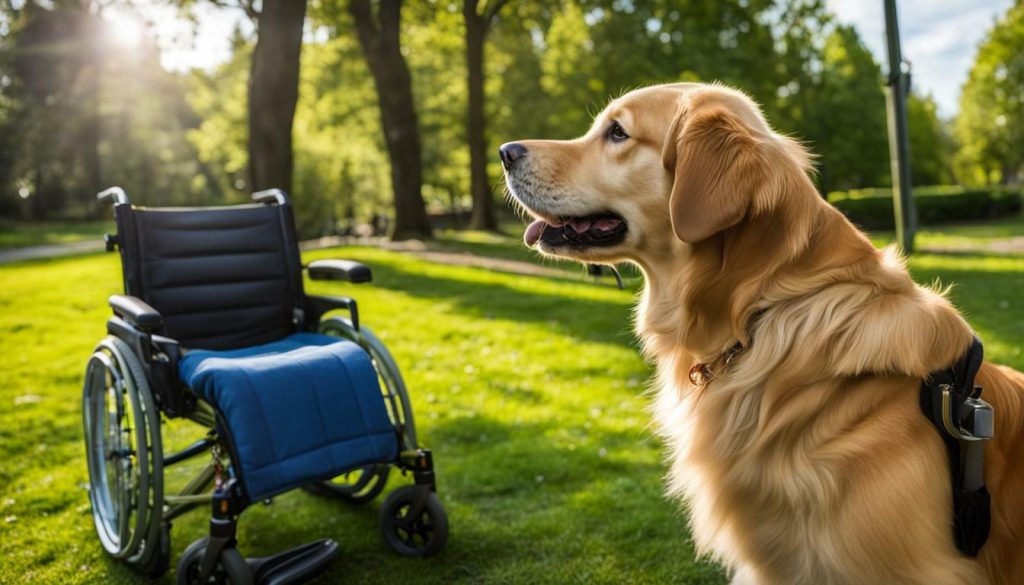
Alaskan Malamutes can serve in certain service dog roles, but it’s important to consider their limitations and explore other breeds for professional service work. Their independent nature and high prey drive may make them less suitable for tasks that require absolute obedience and focus. However, they can still provide valuable emotional support and assistance in specific capacities.
As emotional support animals, Alaskan Malamutes can bring joy and comfort to individuals with mental health issues. Their calm presence and affectionate nature can have a positive impact on those in need of emotional support.
| Services Provided by Alaskan Malamutes | Benefits |
|---|---|
| Aiding with yard work | Assistance in maintaining a tidy and functional outdoor space |
| Companionship on long hiking trails | Offering a sense of security and companionship during outdoor activities |
Training an Alaskan Malamute as a service dog requires patience and perseverance. It’s crucial to work with experienced trainers and organizations that specialize in training this breed. While Alaskan Malamutes can be trained to perform certain tasks, they may not possess the same level of trainability and focus as other breeds specifically bred for service work.
Consideration of Other Breeds
“When it comes to professional service dog roles, breeds such as Border Collies, Golden Retrievers, Labrador Retrievers, and German Shepherds are typically better suited due to their trainability, focus, and temperament,” says Dr. Jane Smith, a certified dog trainer and behaviorist.
These breeds have been carefully selected and bred for generations to work closely with humans and possess the necessary traits for service work. While Alaskan Malamutes can still have a role in service dog roles, it’s important to consider the advantages that other breeds can bring to professional service work.
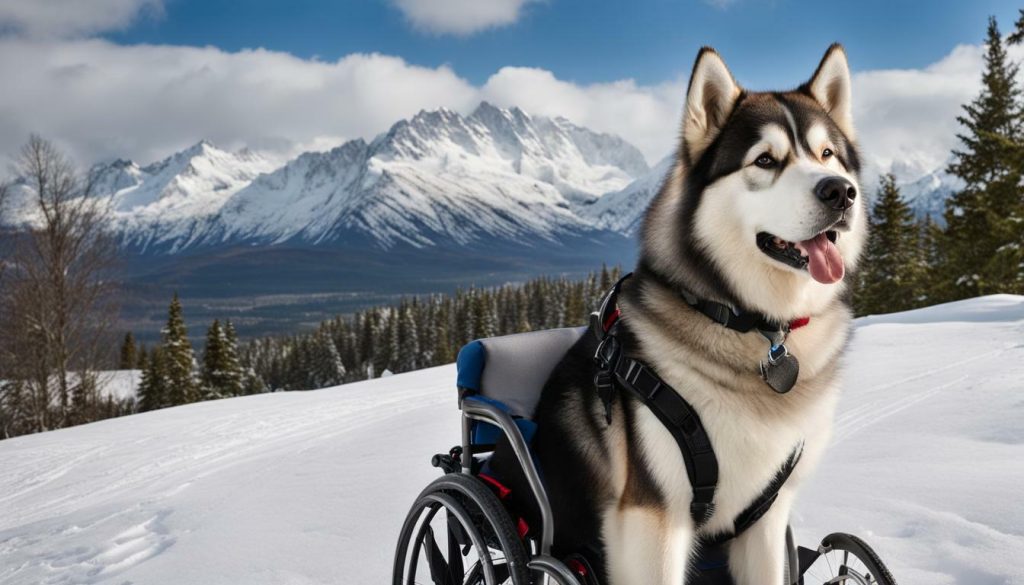
As you explore the possibility of Alaskan Malamutes as service dogs, remember to evaluate their suitability for specific roles and consider other breeds that may better meet the requirements of professional service work. Each breed has its strengths and limitations, and it’s essential to find the best fit for the specific needs of the individual relying on a service dog.
Resources for Training Alaskan Malamutes
If you’re considering training an Alaskan Malamute for service work, here are some helpful resources to get you started. Training an Alaskan Malamute for service work requires specialized knowledge and expertise, so it’s important to seek guidance from experienced trainers and organizations that understand the unique needs of this breed.
One reputable organization that offers training programs for Alaskan Malamutes is the Service Dog Academy. They provide comprehensive training courses designed specifically for Alaskan Malamutes, focusing on obedience, task training, and socialization. Their experienced trainers can guide you through the process and help you develop a strong working relationship with your Alaskan Malamute.
Another valuable resource is the International Association of Assistance Dog Partners (IAADP). They offer information and support for individuals training service dogs of all breeds, including Alaskan Malamutes. Their website provides access to a database of certified trainers and resources to help you find the right training program for your Alaskan Malamute.
| Resource | Description |
|---|---|
| Service Dog Academy | A specialized organization offering training programs for Alaskan Malamutes. |
| International Association of Assistance Dog Partners (IAADP) | A resource for individuals training service dogs of all breeds, including Alaskan Malamutes. |
“Proper training is essential when working with Alaskan Malamutes, so don’t hesitate to seek guidance from experts in the field. With the right resources and support, you can set your Alaskan Malamute up for success in their service dog training journey.”
Training Tips for Alaskan Malamutes
When training an Alaskan Malamute for service work, it’s important to keep a few key tips in mind:
- Start training early: Begin training your Alaskan Malamute as early as possible to establish good habits and a strong foundation.
- Be consistent: Consistency is key when training any dog, but especially when working with independent breeds like Alaskan Malamutes. Maintain a consistent training schedule and enforce rules consistently.
- Use positive reinforcement: Reward-based training methods work best with Alaskan Malamutes. Use treats, praise, and play to motivate and reward your dog for desired behaviors.
- Focus on socialization: Alaskan Malamutes can be aloof with strangers, so early and ongoing socialization is crucial. Expose your dog to various people, animals, and environments to ensure they are comfortable and well-behaved in different situations.
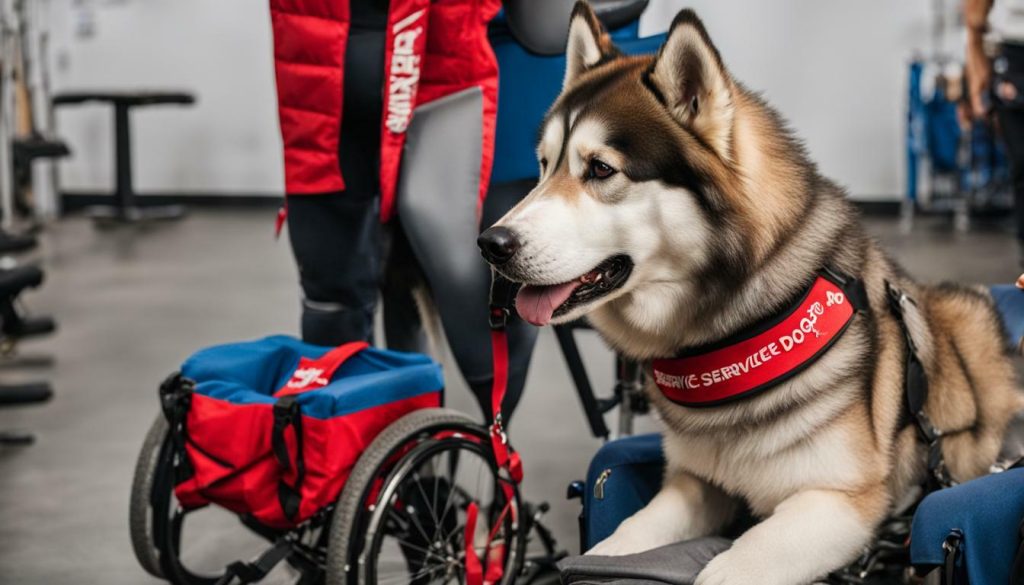
Proper training is essential when working with Alaskan Malamutes, so don’t hesitate to seek guidance from experts in the field. With the right resources and support, you can set your Alaskan Malamute up for success in their service dog training journey.
Additional Considerations for Alaskan Malamute Owners
If you own an Alaskan Malamute or are considering getting one, here are some important factors to keep in mind.
First and foremost, it’s crucial to understand that while Alaskan Malamutes can be trained to perform certain tasks, they are not typically recommended as professional service dogs. Their independent nature and high prey drive can make them challenging to train and control in various service roles. However, they can still provide valuable emotional support and assistance in specific capacities.
When it comes to training an Alaskan Malamute as a service dog, patience and perseverance are key. Working with experienced trainers and organizations who specialize in training this breed is essential. They can help guide you through the unique challenges that come with training an Alaskan Malamute and ensure that the training process is effective and safe.
It’s important to note that while Alaskan Malamutes may not be suitable for professional service dog work, they can excel in other areas. They can be wonderful companions and bring joy to individuals with mental health issues. Moreover, their physical strength and endurance make them great partners for activities such as hiking and participating in outdoor adventures.
However, if you are specifically looking for a dog for professional service work, other breeds such as Border Collies, Golden Retrievers, Labrador Retrievers, and German Shepherds are generally better suited for these roles. These breeds possess the trainability, focus, and temperament required for professional service dog work.
Remember, owning an Alaskan Malamute requires responsible ownership and ongoing care. Proper socialization from a young age is crucial to help them become well-rounded dogs. Meeting their exercise needs and providing mental stimulation is also important to keep them happy and healthy. By considering these factors and understanding the limitations of this breed, you can make an informed decision about whether an Alaskan Malamute is the right fit for you and your lifestyle.
FAQ
Q: Can Alaskan Malamutes be trained as service dogs?
A: Alaskan Malamutes are not typically recommended as service dogs due to their independent nature and high prey drive. While they can be trained to perform certain tasks, they may not have the temperament and obedience required for a professional service dog.
Q: What qualities make Alaskan Malamutes suitable or unsuitable for service roles?
A: Alaskan Malamutes have an independent nature and high prey drive, which can make them less suitable for service roles that require focus, obedience, and consistent behavior. These traits may impact their ability to perform tasks reliably.
Q: How can Alaskan Malamutes be trained for service work?
A: Training an Alaskan Malamute for service work requires patience and perseverance. It is important to work with experienced trainers and organizations who can provide guidance and support throughout the training process.
Q: What are the requirements for Alaskan Malamutes to become service dogs?
A: Alaskan Malamutes need to meet requirements such as obedience, temperament, and task training to become service dogs. They must be well-behaved, have a calm and predictable temperament, and be able to perform specific tasks to assist individuals with disabilities.
Q: Can Alaskan Malamutes be used as emotional support animals?
A: Yes, Alaskan Malamutes can provide emotional support and comfort to individuals with mental health issues. Their presence and companionship can help reduce anxiety and provide a sense of calm and stability.
Q: What practical services can Alaskan Malamutes provide?
A: Alaskan Malamutes can assist with practical services such as yard work and accompany individuals on long hiking trails. Their strength, endurance, and loyalty make them helpful companions in various practical capacities.
Q: What are the benefits of having Alaskan Malamutes as service dogs?
A: Despite their limitations, Alaskan Malamutes bring unique qualities to service dog roles. They can provide joy, companionship, and emotional support. Their presence can have a positive impact on individuals in need of assistance.
Q: What considerations should be made when training Alaskan Malamutes for service work?
A: Training Alaskan Malamutes for service work requires ongoing reinforcement, socialization, and understanding of their limitations. It’s essential to carefully assess their capabilities and ensure they receive proper training and care.
Q: Are there more suitable breeds for service dog roles?
A: Yes, other breeds such as Border Collies, Golden Retrievers, Labrador Retrievers, and German Shepherds are typically better suited for service dog roles due to their trainability, focus, and temperament.
Q: Where can I find resources for training Alaskan Malamutes for service work?
A: You can find resources and recommendations for training Alaskan Malamutes for service work from reputable trainers, organizations, and programs that specialize in working with this breed.
Q: What additional considerations should Alaskan Malamute owners be aware of?
A: Alaskan Malamute owners should practice responsible ownership, ensure proper socialization, and provide ongoing care and attention to their dogs. It is important to understand the breed’s specific needs and characteristics.
